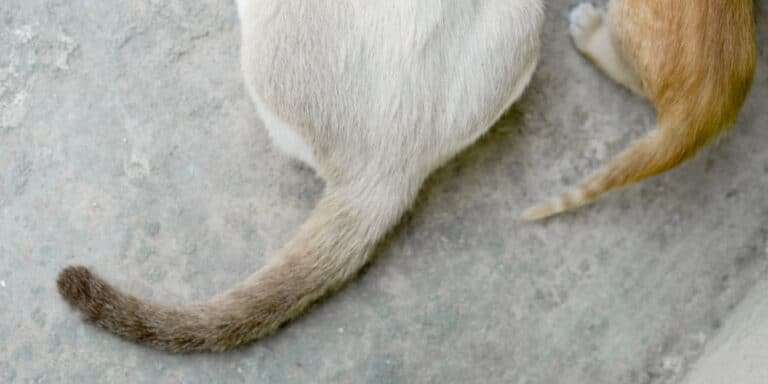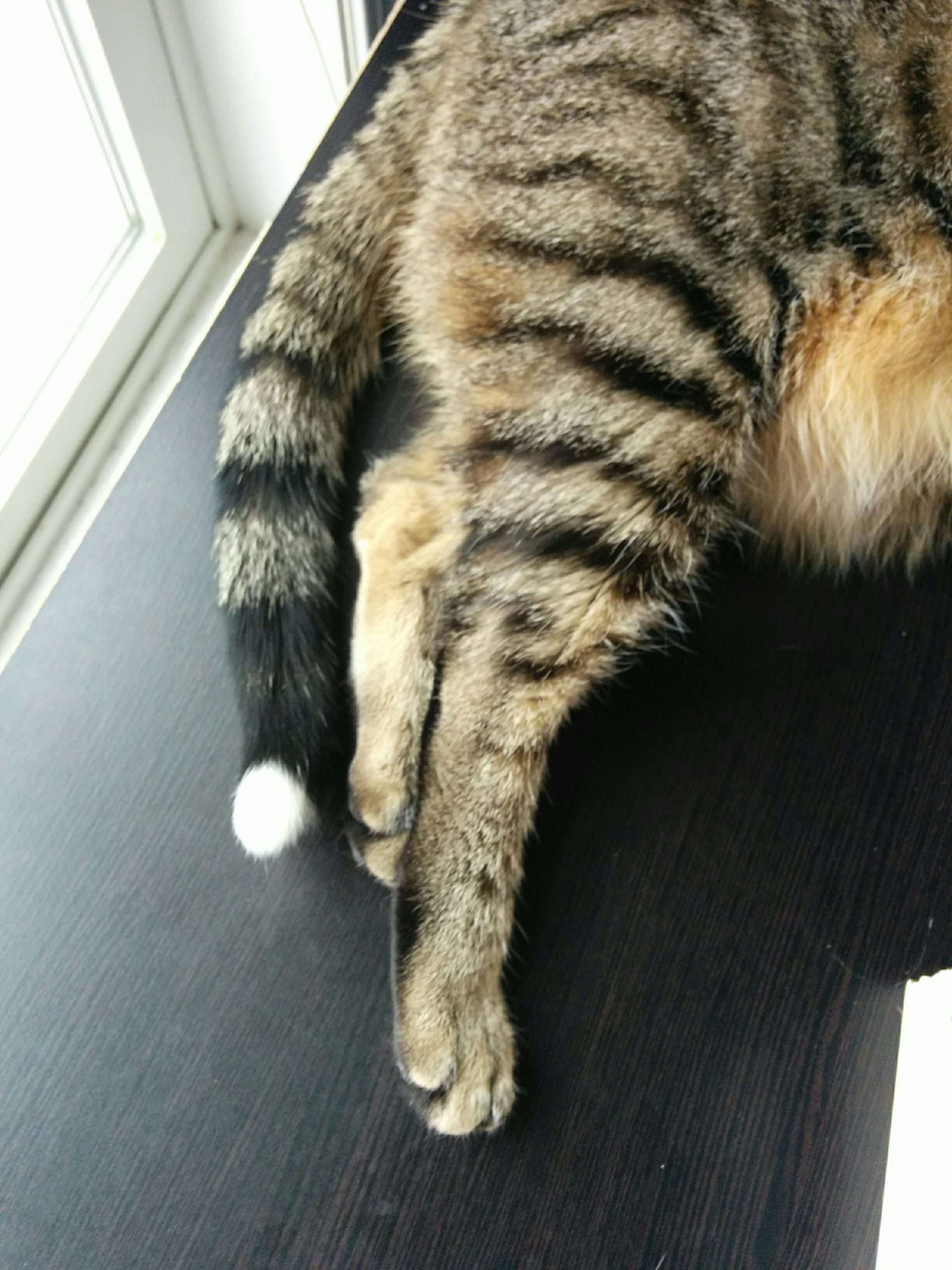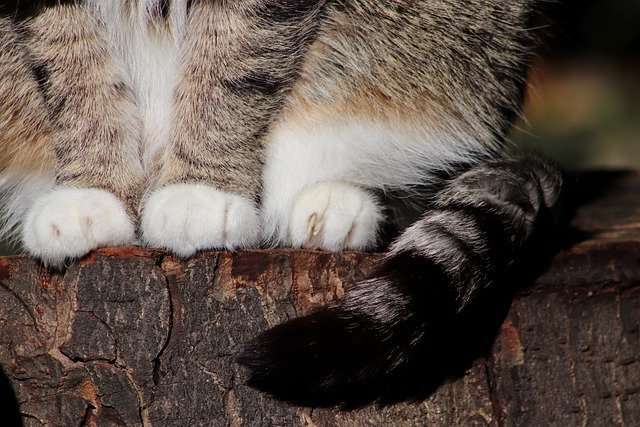Should We Be Concerned When Our Pets Chase Their Tails
Of course, if your dog or cat is chasing its tail nonstop, it might be time to speak with your vet. “It really depends on the context of the tail chasing,” Erin said. “Pets may do this on occasion during play, but if tail chasing becomes repetitive, injurious, you can’t stop the behavior easily, or other behavior changes accompany it, then it’s time to see a vet to help out.”
Erin recommends using your best judgment. “Outside of play, when tail chasing becomes obsessive and repetitive, it may not be a direct communication to us, but it does help communicate to us that something may be going on that is causing that pet distress,” she explained. “It can become part of a pet’s behavioral vocabulary where their behavior and body language tells us how they are feeling at any given moment.”
Is It Normal That A Cat Chases Its Tail
Tail chasing is normal depends on the specific situation. If kittens and young cats do it, its normal as long as other symptoms do not accompany it. This is just a phase for young felines, and they will eventually outgrow it. Their hunting instinct and inquisitive nature have got them interested in everything around them including their tails!
However, when tail-chasing happens with an adult cat, there are a few other things to consider. It could be that your kitten kept its tail-chasing habit and took it into adulthood, but this is rare. So, you should also keep a close eye out for other symptoms that could point out to a possible health condition.
Any strange signs outside of the normal pattern can mean that your feline has something else going on that is responsible for them chasing their tails. If you notice that shes not eating, drinking, or sleeping as usual, or that shes acting more aggressive and biting other pets in your home, you should call the vet. Depending on the symptoms, the vet will decide whether the tail chasing is innocent or not. If not, theyll be able to treat the underlying condition.
What Does A Cat Flicking Its Tail Mean
The Quick Flick While a loosely wagging tail can be a sign of focus or playfulness, a rapidly whipping tail that is lashing from side to side more forcefully is a clear indicator that your feline friend is feeling fearful or aggressive. A quick flick of the tail is a warning to other cats and humans to back off.
Recommended Reading: How Much Should A Cat Eat Daily
Cat Tail Positions And What They Mean
Cat tail positions are signals of whats going on inside a kittys complicated mind. With the help of Dr. Perotti-Orcutt and her excellent veterinary research resources, I put together this quick guide to what your cat might be telling you with her tail. As every cat parent knows, cats are individuals and getting to know their personalities through their tail posture, facial expressions, and body language takes time, commitment, and curiosity.
First Is It Normal To See A Cat Chasing His Tail

Some cats, like dogs, do chase their tails just for fun. Some cats will chase their tails for entertainment, but it is less common in cats than dogs, says Dr. Sasha Gibbons of Just Cats Veterinary Hospital in Stamford, Connecticut.
But, sometimes, a cat chasing his tail means a little something more in cat tail language. And, unfortunately, there are times when a cat chasing his tail signals the opposite of fun.
Cats can also chase their tails for a number of medical reasons, Dr. Gibbons explains. Cats will chase their tails if there is an infection and the tail is uncomfortable, or if it is itchy from allergies. Cats can also have a condition called hyperesthesia syndrome, which is caused by overactive nerve endings, and cats feel a tingly sensation on the tail.
Stud tail, which is a cat skin condition, is another issue that might be at play and calls for vet attention.
It is important to know your cats normal body and tail language to make sure he is not acting out because of a medical reason.
Don’t Miss: Are Arrowhead Plants Poisonous To Cats
Is It Normal That A Cat Chases Other Cats Tails
Sometimes cats wont choose if theyre chasing their tail or another cats tail. Many owners see this as an attack and are worried about whether its normal. However, as long as the two felines are playing and there isnt aggression, there is no need to be concerned. They are just playing around together and having fun.
However, a completely different story is when a cat attacks another cats tail, but its accompanied by aggression. In this case, youll notice the cats ears facing backward, they will growl, and the altercation wont be fun. This is not normal and could lead to a catfight, so try to separate your felines before things get nasty.
Does A Cat Know Its Tail Is Part Of Its Body
You might think that a cat chases its tail because it thinks it is an object that just needs chasing. But, if you watch what a cat does after it catches and pounces on its tail, its obvious that they know it belongs there.
Most of the time after the cat seems to attack its tail, it will settle down and start grooming it. The cat knows what it is. In fact, a cats tail is an extension of its spine and helps to control its bowels among other things. If her tail is injured, the injury can cause damage to her bladder, large intestines or anus.
Don’t Miss: Is It Normal For Cats Whiskers To Fall Out
Why Does My Cat Chase His Tail: In
Once it comes to tail chasing, lots of people tend to assume that such behavior is only common in dogs. Well, contrary to popular belief, the average felines also go bonkers over their tail from time to time as well. In most cases, tail chasing in cats is quite fun to watch but keep in mind that it might indicate underlying health issues. Therefore, if feline experts hear questions like “why does my cat chase his tail“, they always advise the cat parents to adopt a careful approach.
So you want to know why your furball is relentlessly chasing after its own tail? Is that is so, you come to the right place. Down below, you shall find everything that you must remember about tail chasing in cats from what motivates them to how to mitigate the behavior.
How Do You Stop A Cat From Chasing His Tail
To know how to stop your cat from doing a certain thing you need to know why your cat is doing that in the first place.
As I have mentioned before there are many factors as to why your cat is chasing his own tail. There can be physical problems as well as neurological problems too.
First if we talk about physical problems then there are problems like flea allergy, irritation, worms etc.
In these cases it is best to take the cat to a vet, there are certain medications that can help. Same goes for the psychological problem.
Don’t Miss: Indoor Cats And Cold Weather
Why Does My Cat Hit Me With Her Tail
Chasing and biting arent the only two weird things cats do with their tails. Sometimes, theyll hit you with it! More than often, shes trying to show interest. Some other times, shes just in the mood to hit you.
Just kidding.
There are plenty of explanations for your cat hitting you with her tail. For starters, your cat may be interested in the activity youre currently doing. If youre cleaning around, she may have taken a liking to what youre doing, and she wants to participate. Hitting you with her tail is a sign of showing interest.
Alternatively, the cat may be concerned about something. If thats the case, youll find her wrapping her tail around your legs, not hitting you with it. That mostly happens when cats get introduced to new environments or strangers.
Theres also one less common reason, which is the cat being angry with you. She may be hitting you with her tail trying to deliver the message. Shell probably try to knock down a couple of items, too, if thats the case.
Tail Held Straight Behind Body
Im interested keep talking. When your cat is standing or walking with her tail held directly behind her, straight or with a slight curve, it can mean that shes curious about whats going on. But watch closely. A very similar tail posture can express uncertainty and might quickly turn into a defensive behavior.
Recommended Reading: Why Does My Cat Squint At Me
Why Do Cats Chase Their Own Tail
Flickr: play4smee
Kittens often have a tail fetish of their own. When they are hyped up, their tail twitching can get them up and turning, doing circles, somersaults, trying everything they can to grab and bite it.
Cats do not usually chase their tail until they are in a certain mood. This behavior is triggered by the same motivation when an excited kitten sees a strip of paper, hair pin or q-tip on the floor, it compels the kitten to arch his back, stand up on his hindquarters to try to appear taller or even raise his hair on his back. The whole reaction comes from cats’ natural predator instinct.
When an extremely excited cat sees his tail moving, he may treat it as prey or find it extremely annoying that he needs to do something about it, thus he goes after it. Of course he is well aware that it is part of his body. That’s why when cats finally wrestle down their own tail, they will start licking and grooming it.
Cats make a lot of cute and silly antics. Chasing their own tail is definitely one of them. However, there are a few cases where chasing their own tail could be a medical cause if the cat detects discomfort or irritation from their tail. In those cases, it is better to fully examine their tail and make sure everything is OK.
What Does It Mean When A Cat Is Chasing His Tail

But, sometimes, a cat chasing his tail means a little something more in cat tail language. And, unfortunately, there are times when a cat chasing his tail signals the opposite of fun.
Kittens especially target their own tails during play. Usually, the youngster outgrows this type of behavior although some older cats will continue to play with their own tails from time to time. Stress can prompt all kinds of behaviors and health issues. What stresses cats varies between individual animals.
Read Also: How Much Should Cat Eat
What If She Attacks Another Cats Tail
When kittens are playing, theyll often chase at each others tails. But the tail-biting can be aggressive when they are fighting.
Watch her body language as she chases the other cats tail. Is she tense? Is she flicking her tail and growling or hissing?
If you observe this aggressive behavior, separate the cats before they cause more damage to each other.
Do you have other ideas why cats attack their tails? Share with us below!
Barry Stingmore is a British content creator living in Fuerteventura, Spain. An animal lover at heart, he shares his home with a dog and four rescue cats.
Barry works with the islands animal charities to help manage and care for feral and abandoned animals. Alongside fieldwork, he works to support the charities with fundraising and raising awareness.
Normal Reasons For A Cat Would Chase Their Tail
As I already stated, cats usually find their tails exceptionally interesting. As a result, they might feel inclined to chase them around as a way to have fun and satisfy their natural curiosity. On such occasions, we have nothing to worry about, as such behavior is completely normal and even healthy!
You May Like: Where Are Maine Coon Cats From
Why Does My Cat Chase His Tail Can Be A Tricky Question
As usual, I did not expect to uncover so many complex causes for a cat chasing their tail. From fleas and infections to actual mental problems there are quite a lot of possible scenarios. However, in most cases, cats chase their tails just because it is fun, both for them and for us.
Still, we must be responsible and keep an eye on our cat at all times. Unusual behavior must not go unnoticed or unaddressed by a professional if needed. Hopefully, my article was useful for people who wonder why does my cat chase his tail. Make sure to check out the rest of my blog for more interesting articles on cats, dogs, and other pets. See you at the next one!
Question: Why Does My Cat Attack Her Tail
Monkey attacks her own tail. Marlene says Monkey did this for a short time after she was spayed a year ago. “She started again intermittently about a month ago and the frequency has increased. Now Monkey hisses and attacks her tail, hissing, and swatting at it, all day and night. She will stop for short times and then start again. We have tried talking to her, picking her up, and squirting her with water from a squirt bottle.”
The veterinarian could find nothing wrong and suggested it was a behavioral issue and suggested tests and possibly kitty Prozac, but they’re beyond the owner’s current budget. Instead, the veterinarian suggested “calming drops” placed in Monkey’s water, and Marlene got a “Good Behavior Calming Collar” which have helped “a tiny bit but not much.
Recommended Reading: How Many Calories Should Cats Eat
Why Does A Cat Chase Its Own Tail
Cats are predatory animals by nature and when they are kittens, they tend to pounce on almost anything that moves near them. You can have a lot of fun watching a kitten or a young cat chase a light beam, wrestle with shoelaces or tangle itself up in a ball of yarn.
Their tails are also something nearby that moves, wags and twitches. Its practically an irresistible object that they need to chase due to their predatory instincts. Indoor cats especially do not have the opportunities that outside cats do to act on their innate instincts, and so they need other ways to expend their energy.
As kittens get older, however, pouncing on and chasing moving objects, including their own tails, may be a less common activity. If you see that your adult cat is still chasing its tail, there are a few good reasons for it and some remedies for curbing the activity.
Keep Your Cat Entertained
If your cat is chasing their tail because of boredom, you can help your cat by making an effort to keep them entertained. These days, you can invest in so many interactive toys and make their life so much more enjoyable. Having toys at home will help sway their attention from the tail and your feline will stop chasing it.
You can get any kind of toy, but one that moves will do the best job. For example, feather wands are an excellent way to release energy while strengthening the bond between the two of you. Another great idea is a scratching post that the cat will climb. Also, toys that felines can hunt can be great to keep them from tail chasing.
Don’t Miss: How Much Should Cats Eat A Day
Why Do Cats Chase Their Tail 10 Common Reasons
Seeing your gorgeous cat going after its tail in circles with incredible speed is one of the most confusing cat parent moments. Is this normal or is it something to worry about? And why do cats chase their tail anyways?
All cats want to have fun and have loads of energy to waste. Kittens and young cats are the most energetic ones, so tail chasing is something they can do daily. Adult cats are more aware of their surroundings and arent as fascinated with their tails. However, this can still happen with older cats as well, and the reason can either be entertainment or a possible health condition.
Below I listed some of the most common reasons, the symptoms you should keep your eyes open for, how to deal with tail chasing depending on the cause. Plus, Ive got all the answers to a few other tail-chasing questions that are definitely on your mind!
Why Do Cats Attack Their Tails

This is a common, and cute, behavior in kittens as they become more aware of their surroundingsincluding that fuzzy thing always following them around. As kittens mature into cats this behavior becomes less common. If your more mature cat is constantly chasing, attacking, or biting its tail it could be a sign that something is amiss. Chronic tail attacks that dont look like much fun to you could mean your kitty is suffering from allergies, an infection, an injury, or even a nerve condition such as hyperesthesia. If youre concerned about this type of cat tail behavior, dont hesitate to call your vet. Just in case!
Also Check: Oldest Cat In The World Alive
Is A Cat Chasing Their Tail Considered Normal Behavior
As we all know, cats are rather curious creatures. Because of this, they are often fascinated by their tails, especially if they are younger or short on other fun stuff to do. It is safe to say that a cat chasing their tail is something quite normal. However, it might also be the result of an underlying medical condition. There are certain warning signs that we, as responsible cat parents, should watch out for.
Lets look at the most common answers to the question of why does my cat chase his tail.